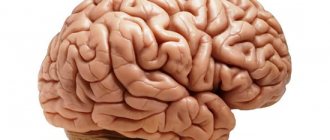What is dementia and what are its manifestations?
Dementia is the loss of cognitive, or, as experts say, cognitive abilities, that is, memory, attention, speech, spatial orientation and others.
Previously, this condition was called dementia, and the extreme degree of its manifestation - marasmus, but now these names are not used in medicine.
With dementia, cognitive abilities are permanently impaired, that is, we are not talking about a temporary deterioration in mental state, as, for example, during an acute illness. The diagnosis of dementia is established if memory and other functions are reduced for more than six months.
Some decline in memory for recent events is natural in old age, and this phenomenon is called benign forgetfulness. When impairment reaches the level of dementia, people have difficulty performing everyday tasks that were previously easy.
If normally a person can make his forgetfulness noticeable only to him, then with dementia the changes are visible first to close people, and then to everyone around him.
How to communicate with patients
People diagnosed with dementia find it very difficult to communicate. They are capricious and offended. Often, they experience persecution syndrome: it seems to them that those around them want to rob them, poison them, or take away their property.
Doctors recommend following the following rules for communicating with patients :
- Maintain patience and calm . The patient should be treated like a child: help to perform basic actions, explain what can and cannot be done.
- It makes no sense to scold a person ; he still does not accept criticism.
- Create a positive atmosphere . Favorite films, interior items, photographs will help with this.
- Patiently, without irritation, listen to the patient's stories , even if it is complete nonsense.
- Show interest . Deterioration of the condition can be provoked by rudeness from others and everyday inconveniences. It is necessary to analyze the situation and eliminate provoking factors in a timely manner.
- Help a person maintain hygiene : wash, change into clean clothes, change bed linen. Being clean, the patient feels much better and shows less negativity.
- If the patient is unable to eat on his own, spoon feed .
Causes of dementia
Dementia is not the name of a specific disease. We are talking about a combination of symptoms (syndrome) that can be caused by various reasons. Only a doctor after an examination can understand which disease led to dementia.
Most often (in 2/3 of cases), dementia in older people develops due to Alzheimer's disease, in which, for reasons that are not entirely clear, nerve cells in the brain steadily die.
The second most common cause of dementia is atherosclerosis of cerebral vessels (deposition of cholesterol plaques in them), and in this case dementia is called vascular.
Alzheimer's disease and vascular dementia are incurable. If the diagnosis is correct, do not believe those who promise recovery. There have been no such cases in history, and this fact must be accepted.
Photo from bestichilov.ru
Other causes of dementia are less common, and there are many of them: alcoholism, genetic diseases, traumatic brain injuries, lack of thyroid hormones, increased intracranial pressure and others. In some of these cases, it is possible to address the cause and cure the dementia.
Memory loss and loss of everyday skills are not normal at any age. It is always the result of illness or injury. It is very important to recognize dementia early and see a doctor.
How to recognize dementia in its early stages
With different types of dementia, symptoms may vary and appear in different sequences. Typically, dementia in Alzheimer's disease develops gradually, gradually, and often loved ones have difficulty remembering when the patient first showed changes.
Unfortunately, many people with dementia never receive modern medical care because their family considers their condition “normal.” Most often, a doctor is consulted at a time when it is no longer possible to slow down the process and the few medications that can temporarily improve the condition no longer work.
A person is likely to develop dementia if: • they constantly lose important things: keys, documents, etc.; • puts things in completely unusual places; • suspects that lost items are stolen and cannot be dissuaded; • asks the same thing over and over again, forgetting the answer; • finds it difficult to navigate on the street; • makes serious mistakes in things that used to be easy (for example, filling out receipts).
Even one of the listed signs is a reason to consult a neurologist or psychiatrist.
A person who develops dementia often feels weak and suffers from the fact that they cannot do things that were previously easy. He can hide problems and simply refuse difficult tasks, explaining that he doesn’t want to or doesn’t have time.
On the Internet you can find many tests that are used for diagnosis, including to assess your own cognitive abilities. It must be understood that a diagnosis is never made solely on the basis of the patient's performance of tests. The doctor evaluates many indicators, but tests are quite suitable as the “first call” that will force you to see a doctor.
One of the simplest and most reliable is the task of drawing a clock. A person is asked to draw from memory a round dial with all the numbers and hands so that they show a certain time, for example, four hours and thirty minutes.
A healthy person can easily cope with this task. With the development of dementia, errors in this test begin to appear very early: for example, the “mirror” arrangement of numbers, the numbers 13, 14 on the dial, etc. Usually, by this time, problems that can alarm relatives are already noticeable in everyday life. There is no need to wait for them to disappear: the sooner you see a doctor, the more treatment options your loved one will have.
Symptoms of senile aggression
The disease does not manifest itself overnight. It develops gradually, which is why it causes great surprise among loved ones who live next to the patient. For a long time, their elderly relative seems completely normal to them, so his inappropriate behavior at first only surprises and even irritates. To understand that it’s time to sound the alarm, you need to know what the symptoms of senile aggression are:
- Suspicion. A person who was previously open to loved ones stops trusting them. It seems to him that they want to deceive him, harm him, that there are secrets from him. When it comes to treatment, it seems to the pensioner that this is being done only in order to get rid of it by being hospitalized for a long time. Explanations that everything is being done for his benefit are met with hostility.
- Greed. Even a previously generous person becomes stingy. He counts every penny, he is afraid to spend money. Elderly people begin to save even on the most necessary things and reproach their relatives for wastefulness. A situation is possible when a patient begins to bring garbage home from the street, since these are “necessary and useful things.” An attempt by loved ones to rid the house of junk is met with sharp rebuff.
- Jealousy for no reason. An elderly person suffering from a psychopathic disorder tends to blame relatives for lack of attention. He feels like he is being ignored. Therefore, he insists on constant attention from his children and grandchildren. He often calls them and demands to come. If relatives cannot fulfill the requirement right now, he becomes very offended.
- Sloppiness. Older people may stop taking care of themselves and their home. Often loved ones attribute this to age, that an elderly person simply does not have the strength. But most often it is a symptom of a disease.
How behavior changes with dementia
Memory and other cognitive abilities are gradually and naturally lost with any progressive dementia. Moreover, the behavior of two patients with the same diagnosis can be very different.
Some are passive and “don’t cause problems,” others are restless and even aggressive. All people with dementia experience behavioral changes, but the predominant impairments vary. Let's look at the most common and difficult behavioral symptoms of dementia for caregivers.
Gustav Klimt, fragment of the painting “The Three Ages of a Woman.” Photo from rfi.fr
Character changes
With the development of dementia, the character always changes. Already in the early stages of dementia, loved ones sometimes notice that a previously active person has become indifferent and lacking initiative. The patient can sit in front of the TV or look out the window all day without doing anything.
The fact is that certain parts of the brain are responsible for the desire for activity and planning, and with dementia their work is disrupted. It is useless to shame the patient or expect him to “pull himself together” and do something on his own.
With dementia, only healthy loved ones can encourage a person to be active, and they will have to support and control what he will do all the time. For some patients, the activity becomes constant and “stupid”, for example, they take things out of closets, sort through something, tear fabric.
With dementia, a person can become selfish, irritable, and impulsive. Sometimes the patient becomes like a child: he is impatient, his mood changes quickly, and “hysterics” occur.
Great grief is caused to loved ones by the fact that a person who is still alive loses his personality and changes irreversibly, but this is inevitable, because the disease destroys his brain.
Rave
We often use the word “delirium” in our speech, but, fortunately, few have encountered this mental pathology in their loved ones. Nonsense is not some absurd statement. In terms of content, it can be very close to reality: for example, after a legal battle, a woman develops a delusion that her ex-husband wants to take away her apartment, which was really the basis of his claims.
The point is not whether the ex-husband wants to take away the apartment, but that even if he changes his mind, this will not affect the woman’s thoughts. A person who has become delusional does not need real facts in order to draw conclusions.
So, delirium is a thought that is generated without relying on outside information. Normally, a person draws conclusions based on what he perceives and adjusts his thoughts taking into account what he sees and hears. In a state of delirium, a person, on the contrary, “adjusts” reality to his thought.
It looks like this: the neighbors didn't just trim the bushes, but to watch his windows; his relatives specially take good care of him in order to lull his vigilance and kill him, etc. The thoughts of a delirious person revolve around the same topic, and it is impossible to dissuade him.
Your words do not correct the picture of reality, because the point of nonsense is that it does not need confirmation. In the vast majority of cases, it is treated with special medications called antipsychotics or antipsychotics.
Delusions in dementia have their own characteristics: usually this is the so-called “delusion of harm”, and we are talking about the fact that neighbors or acquaintances are trying to harm (take away an apartment, poison, ruin life in other ways).
This is “nonsense of a small scale,” that is, the plot is tied to one’s own home and does not extend beyond its borders, for example, in a hospital the patient does not make any accusations against the staff, but once at the dacha, he “remembers” that the neighbors move the fence at night, to seize part of his land, and the situation does not change with the change of neighbors.
Sometimes delirium has virtually no effect on behavior: for example, the patient constantly loses things, is sure that the neighbor is stealing them, but, apart from grumbling, does not perform any actions. In other cases, for delusional reasons, patients become aggressive: they kick relatives and caregivers out of the house, write complaints to the police, etc.
Photo from psychcentral.com
Symptoms and signs
Senile dementia symptoms and signs are rather diffuse over time. Before the disease begins to progress, the person looks completely adequate, the person is able to carry out simple logical operations and take care of himself.
As the disease progresses, these abilities are completely or partially lost.
Symptoms of senile dementia vary depending on the stage of the disease:
1. The mild form is characterized by: • decreased social activity; • inability to perform professional functions or work; • development of apathy and reluctance to do anything; • patients find it difficult to maintain contact with other people. At this stage, depression and feelings of loneliness, uselessness and abandonment may appear. The patient can take care of himself completely.
2. The moderate form is a more severe stage of this disease. It is distinguished by the following signs: • the patient completely loses interest in the world around him and current events; • basic household skills are lost: turning on the TV, using an electric or gas stove, closing the lock, answering the phone; • hygiene skills still remain the same; • depression, anxiety, aggression.
At this stage, this person needs care from close and dear people, or the supervision of a nurse.
3. Severe form – the last stage in the development of the disease. Its main symptoms: • insanity; • it is impossible to explain anything to the patient, he does not perceive information; • all skills and abilities are lost, the most basic ones: holding a spoon, brushing teeth; • inability to retain potassium and urine; • impairment of motor abilities and coordination. • deprivation of speech and inability to communicate even with the help of gestures; • loss of chewing and swallowing skills, weight loss and gradual exhaustion; • facial expressions are practically absent. • inability to sit or hold up your head without assistance.
In severe cases of dementia, the patient must be under constant supervision and care.
Hallucinations
Hallucinations are perceptions without an object. For example, the patient sees non-existent people or animals, talks to them, tries to touch them. In addition to hallucinations, patients with dementia may have illusions (incorrect recognition of a real object) and false memories.
Deprived of a true picture of recent events, their memory is filled with what did not happen: for example, they say that yesterday long-dead acquaintances came to see them. These are not hallucinations, and the treatment tactics in these cases are different, so the doctor needs to tell you in detail how what you consider to be hallucinations manifests itself.
Also, a patient who, at the stage of severe dementia, is frightened by the mirror and swears at it, does not hallucinate. He just doesn't understand that it is his own reflection.
Hallucinations are not only visual, but also auditory, olfactory, tactile and auditory. It depends on which part of the brain is affected.
Most often, the patient is uncritical of hallucinations, that is, he is sure that they really exist. However, sometimes the patient perceives the arguments of others or, based on the properties of the hallucination, understands that the object does not exist.
Treatment
If hallucinations occur, a consultation with the attending physician is required, who will adjust the treatment and prescribe the necessary medications to the patient.
Reference. It should be remembered that visual hallucinations in senile dementia sometimes turn out to be ordinary visual impairment.
When visual acuity decreases, old people can see a person where his clothes lie, point to spots that do not exist, confuse similar objects and people (until they speak).
First of all, sedatives are used (Aminazine, Tizercin), as well as antipsychotics - Haloperidol, Triftazin, Risperidone, Olanzapine. They remove symptoms of psychosis, calm, and cause a hypnotic effect.
In Parkinson's disease or Lewy body dementia, antipsychotics often cause side effects and should be used with caution. In these cases, the medicine, Quetiapine, performed well.
Additionally, a specialist may prescribe relaxers from the group of benzodiazepines: Lorazepam, Clonazepam, Diazepam. These drugs are addictive and can be fatal with prolonged use or abrupt withdrawal.
Although hallucinations most often occur late in the disease, there are cases of their early onset. In such cases, the patient is aware of the problem and can independently seek help to relieve the psychotic symptom.
The first hallucinations are often fleeting, lasting a few seconds, but as the disease progresses they become more realistic and lasting, and the patient ceases to distinguish fiction from truth. At this stage, it is important to control the process: monitor the timely intake of medications, changes in the patient’s behavior, and notify the attending physician about them. It is strictly forbidden to prescribe or cancel treatment for hallucinations in dementia on your own! This can lead to worsening of the condition and sometimes even more severe consequences.
Sexual disinhibition
This disorder causes many problems for the patient’s loved ones, but they are often embarrassed to tell even the doctor about it. It is especially difficult to cope with disinhibited behavior in men; it can spread not only to the wife, but also to caregivers, and even daughters, whom the patient may no longer recognize.
This is a natural manifestation of the breakdown of certain areas of the brain that make behavior restrained and conscious. A neurologist or psychiatrist should respond correctly to your story about such disorders and prescribe sedatives that reduce sexual desire.











